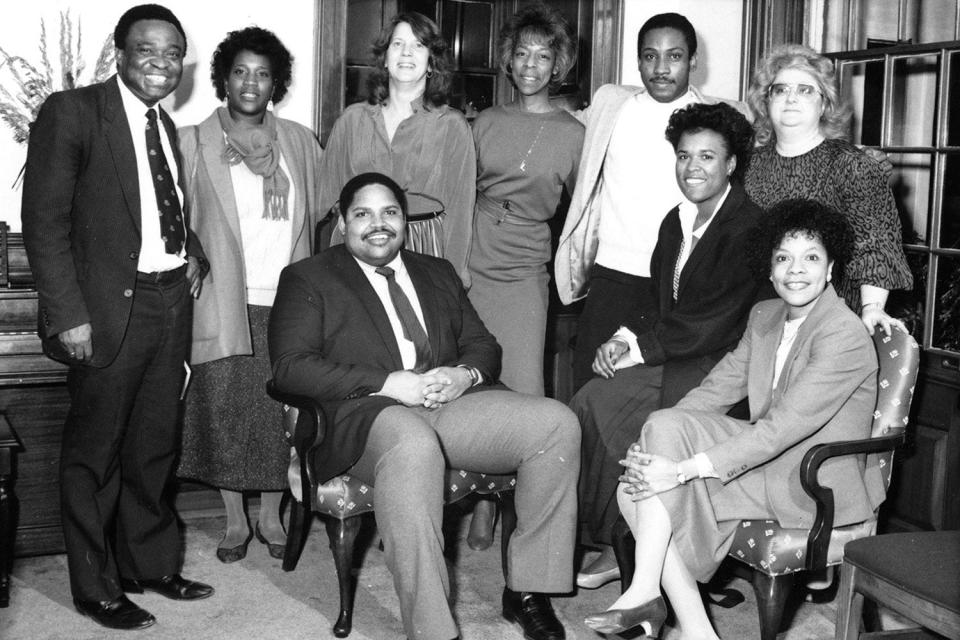'We matter': University of Tennessee group amplifies Black voices on campus for 50 years
This January, the Commission for Blacks at the University of Tennessee at Knoxville celebrates its 50th anniversary. Chancellor Archie Dykes initially formed the group in 1973 as the Task Force on Blacks, made up of faculty, staff, and 12 students.
“The overall goal, to me, was really for the campus to be welcoming to Black (people),” said Maxine Davis. She served on the Commission and championed student success as the assistant vice chancellor for student life and the first female and African American Dean of Students during her 35-year tenure at UT.
It was a critical group formed at a crucial time: the first Black student at UT was Gene Mitchell Gray in 1952, the first Black undergraduate student was Theotis Robinson Jr. in 1961 and the first Black administrator joined UT in the 1970s. The group was the eyes and ears of the Chancellor, providing information on what Black students, faculty and staff were experiencing on campus.
Today, that goal is still the same.
“I feel like the needs are still the same as far as continuing to ensure the visibility of Black faculty, staff and students on campus, that they have a place where they feel like they matter and belong, that we’re still pushing, promoting, implementing, executing and evaluating policies and procedures that impact certain groups,” Commission for Blacks chair JaNay’ Turner said.
Helping the university grow
When Davis first joined the university, UT looked different than it does now. There were fewer Black students and staff compared to the campus population than there are today. Even though various campus groups advocated for Black experiences on campus − there was a Black faculty and staff committee and Minority Student Affairs group − neither had a direct line to the Chancellor.
The commission changed that.
“(The commission) also made a statement to Blacks on campus … that we mattered. That the chancellor wants to understand and to know what’s happening,” Davis said.
One of the commission's first tasks was researching existing policies and procedures that affected Black students and faculty on campus − positively or negatively − and making recommendations to adjust or add new policies and procedures.

“If you’re going to improve the campus for a segment of the population, it’s going to improve the overall campus,” Davis said.
The group also addressed retention among Black faculty and staff, and the work continues today. New faculty and staff at UT plug into resources provided by the Commission for Blacks as part of the onboarding process.
“We’re proud of our commissions. We’re proud of these commissioners. We’re proud of the work that they’re doing, and we want you to get involved, or at least know that these are resources here for you,” Turner said.
Keeping their seat at the table
When Turner thinks about her experiences at UT as a student compared to her experiences as a staff member, she said she has seen growth.
But the work isn't over.
“If we want to continue to grow as a university, be the flagship, be the land grant, be all these things that we are saying that we are, the Commission for Blacks is a part of helping us to continue to grow," Turner said.
The commission ensures that Black campus voices are heard. But getting people to listen can be a challenge.
"It's often challenging when sharing concerns and issues with someone who's not from the same identity group, not because there's anything wrong, but because they see life through a different set of lenses," Turner said. "Their lived experience are not my lived experience."
But those conversations are part of what keeps Turner going; that conversation helps the university change for the better.
“I embrace those (challenging) moments because I feel like I am able to have some of those more meaningful conversations. I get something out of it as much as the other person does. Being able to share why I'm proud to be a part of the Commission for Blacks and have been proud to be a Black individual on campus and what that means and how I contribute to this campus and how others contribute to this campus.”
Becca Wright (she/her) covers the University of Tennessee and statewide higher education for Knox News. She can be reached at becca.wright@knoxnews.com or 865-466-3731. You can follow her on Twitter @beccamariewrong. Our newsroom is dedicated to the public good, and you can support that by subscribing at knoxnews.com/subscribe.
This article originally appeared on Knoxville News Sentinel: University of Tennessee group boosts Black voices on campus for 50 years

